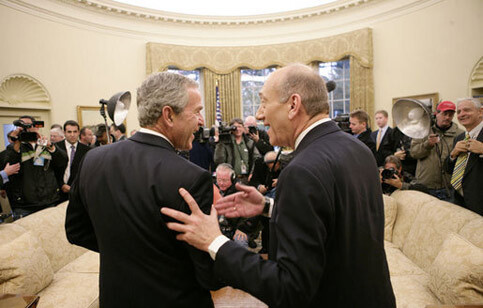The Electronic Intifada 1 December 2006

On friendly turf: President George W. Bush and Israeli Prime Minister Ehud Olmert stand together talking following their meeting with members of the media, 13 November 2006, in the Oval Office at the White House. (White House photo by Eric Draper)
At least twice in the past three weeks American journalists have neglected to ask hard questions of Israeli Prime Minister Ehud Olmert. Softball questions failed to pin down the prime minister on credible allegations of war crimes and human rights violations carried out in recent months by Israeli military forces.
The Washington Post of Sunday, Nov. 12 published a Lally Weymouth interview with Olmert. Weymouth is infamous for never missing an opportunity to miss an opportunity when it comes to tough questioning of an Israeli leader. This time proved no different.
The veteran journalist failed to note that respected human rights organizations have stated both the IDF and Hezbollah may have committed war crimes during the fighting this summer. Disturbingly, Weymouth failed to press or even ask Olmert about indiscriminate Israeli shelling and the grotesque bombardment of southern Lebanon in the war’s final three days with cluster munitions which weeks later were still maiming and killing Lebanese children and other civilians.
On November 8 Israeli shells killed at least 19 Palestinian civilians in the northern Gaza Strip. Amnesty International called for “an immediate, independent investigation and for those responsible to be held accountable.” Amnesty also noted the inadequacy of the Israeli investigation last June into the deaths of a Palestinian family on a Gaza beach. The same Israeli official headed both the beach whitewash and the Beit Hanoun investigation.
A question about whitewash investigations would have been altogether appropriate as Weymouth could have leaned heavily on comments from human rights organizations. Instead, she allowed the opportunity to slip by with no vigorous questioning of the prime minister who this summer oversaw possible war crimes in Lebanon while simultaneously deepening Israel’s occupation of the West Bank and imprisonment of Palestinians in Gaza.
The Nov. 13 meeting between President Bush and Olmert brought another example of a feeble press, exacerbated by the unhelpful ability of the White House to stage manage events by limiting journalists to a handful of questions. Notwithstanding such limitations, it is extraordinary that the two leaders were not asked a single question about the Israeli-Palestinian conflict.
The central regional conflict of the last 39 years is now replaced by the deadly chaos of Iraq and the rapid rise of Iran to fill the US-induced regional power vacuum. There is nothing wrong with discussing these important matters, as well as the role of Syria, but journalists would do well to remember that the ongoing subjugation of the Palestinians continues to drive much of the regional animosity toward the US - particularly in a month in which the US vetoed a UN Security Council resolution critical of Israel’s slaying of Palestinian civilians in Beit Hanoun.
The press on hand also disappointed in allowing one of the most absurd statements of the past three years to pass without comment. In his introductory remarks the Israeli prime minister asserted, “We in the Middle East have followed the American policy in Iraq for a long time, and we are very much impressed and encouraged by the stability which the great operation of America in Iraq brought to the Middle East.” To build on The Forward blog: Olmert sounds as though he’s giving his best Borat impression.
When prime ministers start sounding like Borat and journalists let it pass, we have a problem. Tough questions put to presidents and prime ministers on the American and Israeli occupations are long overdue.
Michael F. Brown is a fellow at the Palestine Center. Previously, he was executive director of Partners for Peace and Washington correspondent for Middle East International. His views are his own and do not necessarily reflect those of the Center.




